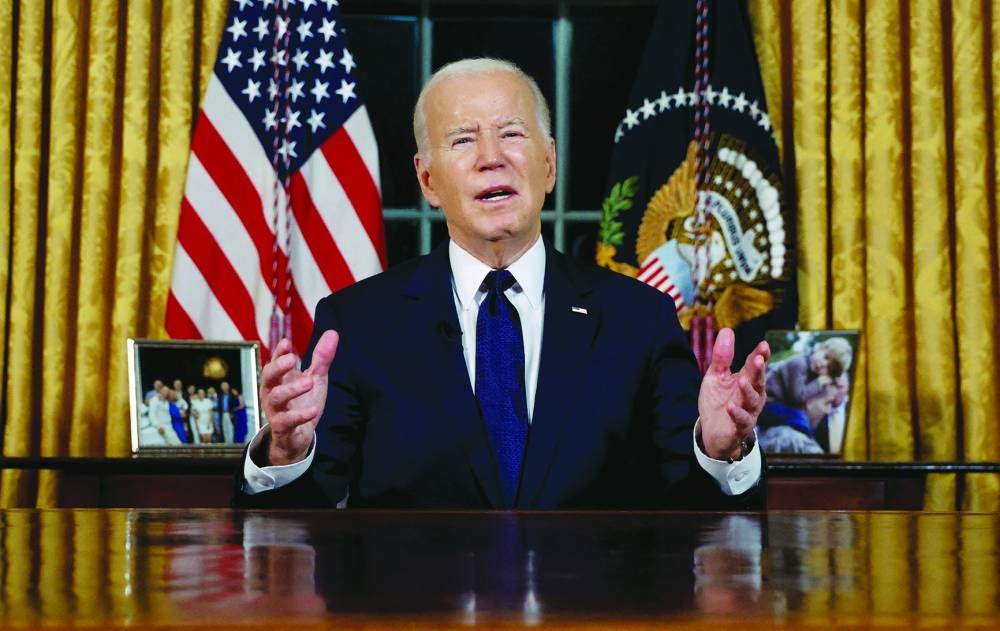US President Joe Biden has urgently requested military aid for Ukraine and Israel in a massive $106bn national security package, but Republican paralysis in Congress means it hit an immediate wall.
Biden’s demand came a day after he drew a direct link between the Hamas attack on Israel and Russian President Vladimir Putin’s invasion of Ukraine to convince Americans that the United States must show global leadership.
The 80-year-old Democrat argued in an impassioned Oval Office speech that the huge sums involved – a total of $105.85bn, including $61bn in military aid for Ukraine and $14bn for Israel – would secure US interests for generations.
“American leadership is what holds the world together. American alliances are what keep us, America, safe,” Biden said in an Oval Office address to the nation on Thursday night.
“The unwavering bipartisan support for Ukraine in the United States is incredibly encouraging for all of our warriors and for our entire nation,” Ukrainian President Volodymyr Zelensky wrote on Friday on social media.
“America’s investment in Ukraine’s defence will ensure long-term security for all of Europe and the world,” he said.
However, Biden’s request comes as the US House of Representatives remains in chaos, with Republicans, who hold a narrow majority, in their worst meltdown for decades and unable to elect a Speaker.
“The world is watching and the American people rightly expect their leaders to come together and deliver on these priorities,” White House Office of Management and Budget director Shalanda Young said in a letter to Congress. “I urge Congress to address them as part of a comprehensive, bipartisan agreement in the weeks ahead.”
Biden’s mega aid package yokes a host of disparate crises together in the hope that an appeal to US national unity will help shake House Republicans out of their dysfunction.
And it throws an olive branch to Republicans in the form of $6.4bn in funding for the migration crisis at the southern border with Mexico – a central concern for the right-wing party.
The package includes $7bn for countering China and strengthening allies in the Asia-Pacific region, and over $9bn for humanitarian assistance for Gaza, Ukraine and Israel.
However, most importantly, however, the huge funding ask is an attempt to bolster waning support for Ukraine by linking it with funding for Israel – which does have widespread bipartisan backing.
There is considerable support in Congress for Ukraine, including among prominent Republicans in the Senate, where the Democrats hold the majority.
Senate Majority leader Chuck Schumer promised quick action in the upper house.
“Senate Democrats will move expeditiously on this request, and we hope that our Republican colleagues across the aisle will join us to pass this much-needed funding,” he said in a statement. “This legislation is too important to wait for the House to settle their chaos.”
However, it’s not clear that even if Republicans set aside their squabbling and choose a Speaker they would then agree to pass more aid for Ukraine.
A growing number of Republicans – and US voters in general – oppose to adding to the $43.9bn in security assistance that the United States has committed to Ukraine since Moscow launched its full-scale invasion in February 2022.
Biden’s speech on Thursday drew the link between the wars in Ukraine and Israel as part of a vision of the US as a “beacon to the world” confronting “terrorists” like Hamas and “tyrants” like Putin.
It was Biden’s bid to remind Americans of the decades-long US geopolitical stance as leader of the Western democracies.
The Kremlin on Friday denounced Biden’s comments.
“We do not accept such a tone in relation to the Russian Federation, in relation to our president,” Kremlin spokesman Dmitry Peskov told reporters.
Peskov said such “rhetoric is hardly suitable for responsible leaders of states, and it can hardly be acceptable to us”.
US efforts to “contain” Russia would prove ineffective, he added.
About four in 10 respondents in a Reuters/Ipsos poll conducted last week said the US should support Israel’s position in the current conflict when given a range of options.
Nearly half said Americans should remain neutral or not be involved.
In a separate Reuters/Ipsos poll earlier this month, roughly the same proportion agreed with a statement that Washington “should provide weapons to Ukraine”.

Biden: American leadership is what holds the world together. American alliances are what keep us, America, safe.
